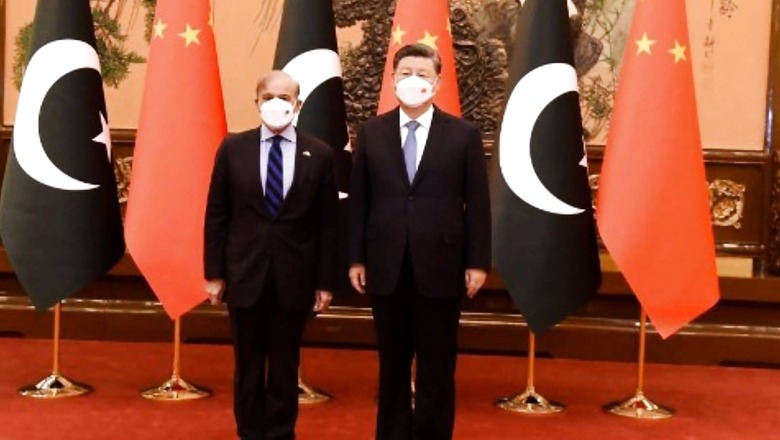
views
This year has seen China’s Foreign Minister Wang Yi offering support to the expansion of the China-Pakistan Economic Corridor (CPEC) to Afghanistan, merely days after India slammed a joint Chinese-Pakistani bid to entice third countries to join their ambitious connectivity corridor that runs through Pakistan-occupied Kashmir (PoK). Wang Yi made the offer to Afghanistan’s Interim Foreign Minister, Amir Khan Muttaqi, at a meeting in Tashkent, Uzbekistan, on the sidelines of the Shanghai Cooperation Organization (SCO) Foreign Ministers’ meeting.
According to Pakistan’s Foreign Office, Pakistan and China have agreed to welcome interested third parties to join the multi-billion-dollar CPEC. While Beijing and Islamabad continue to refer to it as an open and inclusive forum for mutually beneficial engagement, New Delhi must evaluate the far-reaching consequences of such a development for not only India, but the whole subcontinent.
CPEC and India’s opposition
The CPEC is a 2013 corridor that connects Pakistan’s Gwadar port on the Arabian Sea with Kashgar in Northwest China’s Xinjiang Uygur Autonomous Region (XUAR). It is a component of China’s grandiose Belt and Road Initiative (BRI), which is usually described as President Xi Jinping’s pet project. This $54 billion infrastructure development project connects China’s Xinjiang area to Pakistan’s Gwadar port, to foster energy, transportation, and industrial cooperation.
New Delhi has been extremely critical of the projects that are being carried out as part of the so-called CPEC project. Ministry of External Affairs (MEA) spokesperson Arindam Bagchi said, “Any such actions by any party directly infringe on India’s sovereignty and territorial integrity. India firmly and consistently opposes projects in the so-called CPEC, which are in Indian Territory that has been illegally occupied by Pakistan.”
India has long held that connectivity projects must be anchored on globally recognised international principles, adhere to the ideals of openness, transparency, and budgetary discipline, and be pursued in a manner that respects the sovereignty, equality, and territorial integrity of other states. The CPEC, on the other hand, passes through regions of the Union Territories of Jammu and Kashmir and Ladakh that are under Pakistan’s illegal and forcible occupation, threatening India’s sovereignty and territorial integrity.
While India has maintained its position, China and Pakistan look ready to engage more nations in the CPEC, indicating China’s insensitivity to India’s concerns. China wants CPEC to be expanded to Afghanistan. In September 2022, Ahsan Iqbal, Pakistan’s federal minister for planning, development, and special projects acknowledged this. According to Islamabad, CPEC would offer Pakistan a unique opportunity to harness its geographic location for regional connectivity.
Fear of China-Pak-Afghan nexus
Afghanistan has shown a strong desire to join since October 2016 and has even done so through official routes. For example, Dr Omar Zakhilwal, Afghanistan’s ambassador to Pakistan, reiterated his country’s desire to join CPEC and stated that a development initiative of this scale will benefit not only Pakistan, but the whole region. In 2019, the foreign ministers of China, Pakistan and Afghanistan held a dialogue in this regard. They agreed at the time that the three nations should improve mutual connectivity and urge for CPEC to be extended to Afghanistan. However, Afghanistan, especially under President Ghani held that Kabul will join CPEC only if Islamabad allows connectivity between India and Afghanistan.
After seizing Kabul, the Taliban have left the country’s economy in shambles, with the Afghan central bank’s deposits overseas blocked and help to Afghanistan halted by the US and other donors. In the midst of this, Pakistan invited Taliban-led Afghanistan to join the CPEC during the 3rd CPEC Joint Working Group (JWG) on International Cooperation and Coordination (JWG-ICC) meeting in August 2022. The Afghan Taliban, which has enjoyed Pakistani support, also expressed its desire to be a part of the multi-billion connectivity project.
The timing couldn’t be better. The country possessing 1.4 million tonnes of rare earth minerals — crucial for not only consumer electronics but also military equipment – is struggling economically as a result of the withdrawal of foreign aid, following the Taliban takeover.
Afghan participation in CPEC will allow Islamabad and Beijing to harness energy and other resources, as well as gain access to Afghanistan’s vast wealth of untapped natural resources, ranging from copper, gold, uranium, and lithium, which are critical components for a variety of advanced electronic technologies and high-tech missile guidance systems.
The two countries see the inclusion of Afghanistan as a significant step forward in the latter’s economic rehabilitation. If they helped the country get back on its feet economically, critics could no longer say they are wielding political influence without doing anything to restore a legitimate government or protect the human rights of Afghans.
India has often condemned China and Pakistan for their efforts to get third nations to join the CPEC projects and has strongly responded to speculations that Afghanistan may be included in the project. In a statement issued in July, New Delhi described a third nation joining CPEC as illegal, illegitimate, and unacceptable.
Third-party participation in CPEC, disguised as assisting the poor nation in managing its economy, extends New Delhi’s two traditional rivals’ strategic, economic, and political power. It tries to capitalise on the power vacuum left by the US withdrawal.
China’s debt always comes with increasing concerns around debt sustainability, just look at Pakistan and Sri Lanka! India’s concern — that comparable economic and social unrest in Afghanistan might have long-term consequences for India and the region — is justified.
In recent years, India has undertaken a deliberate policy shift towards the Central Asian area, particularly in terms of connectivity. One important source of concern for India is that Afghanistan’s involvement in CPEC reduces the scope of India’s investment in Iran’s Chabahar port. India intends to project the port as a gateway to lucrative prospects for commerce between India, Iran, and Afghanistan with Central Asian countries. Pakistan is also hoping to undermine India’s influence in Central Asia and CPEC might provide the perfect platform for this.
Even in terms of development aid, India has been the largest regional lender to Afghanistan, investing more than $2 billion for projects such as road construction, power plant construction, dam construction, parliament building, rural development, education, infrastructure, and much more. With the extension of CPEC, China is projected to displace India and take the lead in Afghanistan’s development sphere. On the security front, experts are concerned about China’s control of Afghanistan’s Bagram air force base. The Americans continued to make extensive use of it right until their withdrawal.
Conclusion
India has reason to be concerned since it believes its security concerns are being repeatedly ignored. Given China’s, Pakistan’s, and the Taliban’s enmity against India, Afghanistan’s participation in CPEC will almost certainly be of strategic significance for China and a loss for India. While Russia has so far rebuffed repeated Chinese and Pakistani approaches and abstained from joining the CPEC, China and Pakistan have increased their efforts to involve other nations in the project, like Turkey and Uzbekistan.
CPEC has the potential to alter the power balance in the region in China’s favour, much to India’s displeasure. If not dealt with properly, this might change the strategic dynamics of the region and the credibility of India’s claim over PoK in the long run.
Esha Banerji is presently associated with a premier think-tank in India, specialising in defence, security, and strategic studies. Her research interest and focuses of analysis are defence strategy, geo-economics, foreign affairs, and the implications of Chinese security developments on the region, especially India. Views expressed are personal.
Read all the Latest Opinions here




















Comments
0 comment